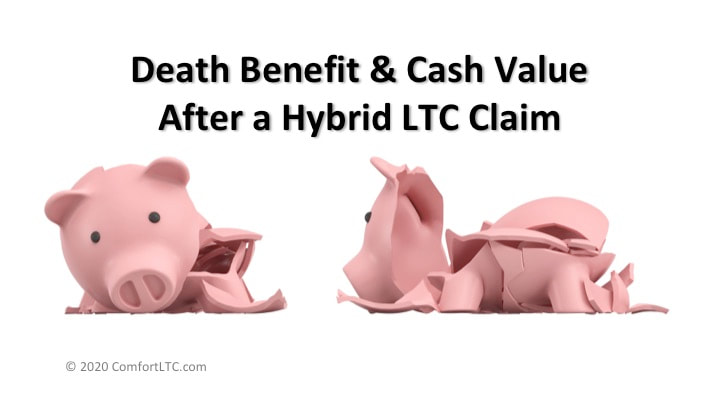Are "hybrid" LTC policies with a death benefit really a better deal?
You'll be surprised at what our analysis shows, and why you need to make sure you know ALL your options before you buy LTC insurance.
by Bill Comfort, CSA, CLTC, LTCCP
April 14, 2020
April 14, 2020
Introduction
|
Author's note: There is nothing inherently wrong with any particular type of long-term care insurance, but there is an explosion of new offerings and designs - especially LTC policies that combine annuities or life insurance with some type of accelerated and/or extended benefits provision to pay for long-term care - and there is a lot of hybrid LTC marketing hype that does not stand up to thoughtful analysis.
Generally, when comparing hybrid vs. traditional long term care insurance or any other type of policy design - one type is neither better nor worse than another; they are simply different ways to fund the need - different ways to plan ahead to cover the cost of care. There are circumstances - tax, financial, personal or medical - where a hybrid LTCI policy may be the best solution, but all plan options must be considered and calculated uniquely for each individual client. This new range of LTC insurance options means consumers - and fiduciary advisors - must work with an independent specialist who represents ALL the options to serve their best interest; this is especially true if you are only offered one type of plan - you must get a second-opinion! As a true independent brokerage agency, Comfort Long Term Care not only offers all of the different LTC insurance policy types but also represents multiple companies for each option. CLICK HERE for a description of the different types of "hybrid" or "linked-benefit" LTC policies available. |
When looking at hybrid LTC options I feel like Tom Hank's character in "Big" trying to figure out the appeal of an office building-to-robot transformer toy: "I don't get it."
Here's the hybrid sales pitch:
"Traditional" (or "stand-alone") long term care insurance is a "use it or lose it" proposition. If you never need care, 20 or 30 years of premiums are "wasted". But with a "hybrid" (or "linked-benefit" or "combo" or "asset-based") LTC policy you can have it all: long-term care benefits or a death benefit for your heirs if you never need care or a cash value return of up to 100% of your premium paid.
Sounds great, right? Who wouldn't want to get their money back? Marketing messages suggest you get all three, but that is misleading - you only get one. And you pay dearly for what you may not need.
Sounds great, right? Who wouldn't want to get their money back? Marketing messages suggest you get all three, but that is misleading - you only get one. And you pay dearly for what you may not need.
"Use it or lose it" vs. "Use it AND lose it"
When comparing hybrid vs. traditional long term care insurance, the marketing pitch that traditional LTCI is a "use it or lose it" proposition, and therefore a "bad deal," is an insidious - and unfair, if not misleading - proposition. If it is an appropriate statement, then hybrid LTCI plans should be labeled as "use it AND lose it."
"Use it or lose it" is a FEATURE, not a failure
This is the very essence of insurance: You do not expect - or even want - to use it. Does anyone lay awake in bed at night wishing for a big kitchen fire because their homeowner's company has been ripping them off for 20 years?! Of course not.
Insurance should cover large, unexpected risks with, hopefully, the lowest possible premiums. This is how traditional LTC insurance works. You only pay for LTC coverage - the most coverage possible for the least amount of premium. Your premiums are not "wasted" - another misconception - because you pay for coverage and the security along the way if anything were to happen. You may not like paying premiums, but the alternative - not being covered - is worse if the catastrophic need for long-term care happens. This is "Insurance 101."
A well-designed traditional LTC plan for couples will include a "shared benefits" feature. If one spouse dies without needing care, his or her premiums - and benefits - are not "wasted" because the unused benefits roll-over to the surviving spouse!
Getting your money back - a return of your premiums paid - if you never use the main LTC insurance benefit sounds like a great idea until you realize how much extra you have to pay for that right. Traditional LTC insurance policies have offered a return of premium rider for 20+ years which does the same thing as a hybrid plan, yet hardly anyone ever chose the option. Why? Because it is very expensive - about the same as hybrid premium.
Do not just accept the sales pitch, you must carefully consider and calculate which plans really have the lowest "NET" costs.
This is the very essence of insurance: You do not expect - or even want - to use it. Does anyone lay awake in bed at night wishing for a big kitchen fire because their homeowner's company has been ripping them off for 20 years?! Of course not.
Insurance should cover large, unexpected risks with, hopefully, the lowest possible premiums. This is how traditional LTC insurance works. You only pay for LTC coverage - the most coverage possible for the least amount of premium. Your premiums are not "wasted" - another misconception - because you pay for coverage and the security along the way if anything were to happen. You may not like paying premiums, but the alternative - not being covered - is worse if the catastrophic need for long-term care happens. This is "Insurance 101."
A well-designed traditional LTC plan for couples will include a "shared benefits" feature. If one spouse dies without needing care, his or her premiums - and benefits - are not "wasted" because the unused benefits roll-over to the surviving spouse!
Getting your money back - a return of your premiums paid - if you never use the main LTC insurance benefit sounds like a great idea until you realize how much extra you have to pay for that right. Traditional LTC insurance policies have offered a return of premium rider for 20+ years which does the same thing as a hybrid plan, yet hardly anyone ever chose the option. Why? Because it is very expensive - about the same as hybrid premium.
Do not just accept the sales pitch, you must carefully consider and calculate which plans really have the lowest "NET" costs.
Paying more just to get your money back is not a benefit;
it's a cost!
"Use it AND lose it"
Hybrid LTC insurance marketing messages sound like you get it all - that you have three, separate "piggy banks" - when in reality by using using any one benefit you lose the other two. A few general examples:
Hybrid LTC insurance marketing messages sound like you get it all - that you have three, separate "piggy banks" - when in reality by using using any one benefit you lose the other two. A few general examples:

Cash Out:
Most hybrid LTC plans have a guaranteed cash value - typically 70% to 100% of premiums paid depending on the carrier & plan.
The "sales pitch" is your cash is still "liquid." But that is misleading. To get your cash back you must surrender your policy - you lose all your coverage: both the LTC benefit and any death benefit. If you take a partial cash value withdrawal you reduce your coverages proportionally, and the same is true if you take a policy loan against the cash value. Raiding the cash piggy bank breaks the other two. It may be "guaranteed", but that does not mean "liquid". Frozen money is not liquid money!
Since the percentage of people who drop their LTC insurance is close to ZERO (0%), the value of paying extra premiums just to have "walk-away" money is illusory.
Most hybrid LTC plans have a guaranteed cash value - typically 70% to 100% of premiums paid depending on the carrier & plan.
The "sales pitch" is your cash is still "liquid." But that is misleading. To get your cash back you must surrender your policy - you lose all your coverage: both the LTC benefit and any death benefit. If you take a partial cash value withdrawal you reduce your coverages proportionally, and the same is true if you take a policy loan against the cash value. Raiding the cash piggy bank breaks the other two. It may be "guaranteed", but that does not mean "liquid". Frozen money is not liquid money!
Since the percentage of people who drop their LTC insurance is close to ZERO (0%), the value of paying extra premiums just to have "walk-away" money is illusory.
Die Without Needing Care:
This is the only scenario where a hybrid LTC insurance plan may "win" when comparing hybrid vs traditional long term care insurance. But not always. The life insurance death benefit is very expensive compared to a separate life insurance policy because you have also paid for LTC benefits and to accumulate guaranteed cash value. (NOTE that the significant premium savings with traditional LTC insurance preserves and can even allow for growth of other assets that can still pass on to heirs as a "death benefit" even after LTC premiums are paid.)
This is the only scenario where a hybrid LTC insurance plan may "win" when comparing hybrid vs traditional long term care insurance. But not always. The life insurance death benefit is very expensive compared to a separate life insurance policy because you have also paid for LTC benefits and to accumulate guaranteed cash value. (NOTE that the significant premium savings with traditional LTC insurance preserves and can even allow for growth of other assets that can still pass on to heirs as a "death benefit" even after LTC premiums are paid.)
The purpose of LTC insurance is to fund for a long-term care need. Focus on a plan that delivers the best value - the most benefits if you need CARE - not if you do NOT need care!
Long-Term Care:
This is truly where "I don't get it." If you have a hybrid long-term care claim lasting more than two years, then all, or nearly all, of the cash value and death benefit is used up first. So a two or three or four year claim - an "average" claim range that everyone should be planning for - destroys both the death benefit and cash value piggy banks. Some hybrid LTC plans do offer a small - 5% to 20% - "residual" death benefit if a LTC claim uses up all of the base life insurance coverage, but, again, the true "net" cost: total benefits received and assets retained minus premiums paid, must be fairly and fully considered.
Hybrid LTC insurance is very expensive - the most expensive - LTC insurance you can buy if you do need care.
This is truly where "I don't get it." If you have a hybrid long-term care claim lasting more than two years, then all, or nearly all, of the cash value and death benefit is used up first. So a two or three or four year claim - an "average" claim range that everyone should be planning for - destroys both the death benefit and cash value piggy banks. Some hybrid LTC plans do offer a small - 5% to 20% - "residual" death benefit if a LTC claim uses up all of the base life insurance coverage, but, again, the true "net" cost: total benefits received and assets retained minus premiums paid, must be fairly and fully considered.
Hybrid LTC insurance is very expensive - the most expensive - LTC insurance you can buy if you do need care.
"But what about premium increases (vs. guaranteed rates)?!"
Yes, most hybrid LTC plans (those that are "true" LTCI hybrids, designed primarily for LTC benefits, but not all "linked-benefits" or "hybrids") have guaranteed premiums - whether a single-pay, 10-pay, or life-pay. And, indeed, no traditional LTC insurance policy has guaranteed premiums; the premiums can be increased. But recognize that when comparing traditional life-pay premiums vs. hybrid life-pay premiums - with identical LTC coverage benefits - the guaranteed hybrid premiums are two to three times (2x - 3x) more expensive than the current, already-risk-adjusted new-business T-LTCI premiums!
Too often those hyping hybrid LTC insurance misrepresent T-LTCI rate increases on old policies and unfairly project into the future the same rates of increase that have happened in the past. One so-called "fiduciary" LTC specialist even tells prospective clients that T-LTCI increases 8% every year - this is grossly deceptive, especially for new-business premiums that already have all of the past pricing mistakes "baked into" the new premiums being quoted.
Looking forward - vs. only trying to drive looking in the rear-view mirror - the risk of significant rate increases on traditional LTC insurance is dramatically reduced. The fundamentals have changed. Read my detailed report here. Read also: "Long-Term Care Insurance: The SOA Pricing Project", Nov. 2016.
Is it worth significantly over-paying just to guaranteed your premiums? Maybe. But it is not as simple as one premiums is guaranteed and the other is not. You must analyze all the numbers - and the significantly different premiums - for your unique personal planning.
Too often those hyping hybrid LTC insurance misrepresent T-LTCI rate increases on old policies and unfairly project into the future the same rates of increase that have happened in the past. One so-called "fiduciary" LTC specialist even tells prospective clients that T-LTCI increases 8% every year - this is grossly deceptive, especially for new-business premiums that already have all of the past pricing mistakes "baked into" the new premiums being quoted.
Looking forward - vs. only trying to drive looking in the rear-view mirror - the risk of significant rate increases on traditional LTC insurance is dramatically reduced. The fundamentals have changed. Read my detailed report here. Read also: "Long-Term Care Insurance: The SOA Pricing Project", Nov. 2016.
Is it worth significantly over-paying just to guaranteed your premiums? Maybe. But it is not as simple as one premiums is guaranteed and the other is not. You must analyze all the numbers - and the significantly different premiums - for your unique personal planning.
"Past performance [rate increases on older policies] is no guarantee of future return [rate increases on new policies]."
Commissions
There is nothing inherently wrong with commissions, unless there is an incentive - especially an undisclosed incentive - to recommend (or dismiss) one type of policy or one type of payment plan vs. another. Are some agents pushing hybrid LTC insurance - especially single premiums - because they make a lot more money a lot sooner than with a traditional LTC policy? Maybe. If an agent or advisor only represents or only presents one type of coverage, you need a second opinion.
In the following reports we will do what most agents and advisors do not, and that is "run the numbers" comparing hybrid vs. traditional long term care insurance, breaking down the actual benefits and costs using real client ages and examples AND fairly showing you the real "net cost" of each!
* For illustrative purposes only generally comparing hybrid vs. traditional long term care insurance. Actual LTC policy costs and benefits are determined by an issued policy. Not all plans, benefits or features may be available in every state. Contact a licensed agent for state-available, personalized quotes and an outline of coverage for the plan(s) being considered including any limitations and exclusions.







